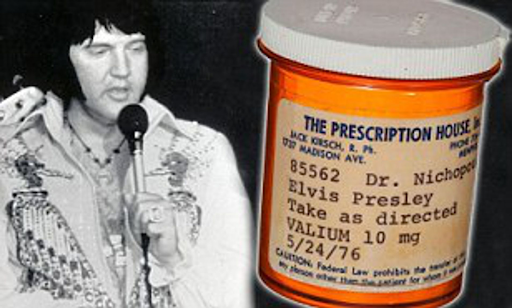New research sheds light on the story of Elvis’ flawed DNA and chronic illnesses. For the first time, a research-backed explanation of why the world lost Elvis on August 16, 1977, is offered. The news reports of the day painted him as bloated and unconscious on his bathroom floor, leaving devastated fans with a graphic, tarnished final image of their shiny idol from Tupelo. Toxicology reports confirmed that he was overloaded with prescription medications — just another cliché, a rock star who popped one too many pills. Those assumptions have plagued the story of Elvis Presley for decades.
Historian and author Sally Hoedel, however, doesn’t see Elvis as a cautionary tale of self-destruction. Instead, she sees a man who struggled, every day, to survive. First, Elvis struggled through extreme poverty. Then, he struggled through extreme fame like no one had experienced before. Finally, he struggled with disease and disorder in nine of the eleven systems of the body. Five of those disease processes, Hoedel finds, were present from birth. She expertly puts all of this into historical context, pointing out differences in medical treatments and protocols for the time. Additionally, the family tree is shown to have the same ailments leading to short lives for Elvis’ mother and three of his uncles, all on the maternal side of the family. With the lack of longevity in Elvis’ family, his death at age 42 is no longer a coincidence and has an explanation.
In her compelling, thought-provoking release, Elvis: Destined to Die Young, Hoedel offers factual and scientific data, plus never-before-published information she gained by interviewing people who personally knew Elvis, to dive deep into his struggles with multiple chronic health conditions. Having access to various medical records and relationships with Elvis’ nursing staff was also invaluable.
Hoedel examines Elvis Presley — devoted son, husband, father and friend — while plowing through the negative hype and legendary myths surrounding the man. Elvis’ downward spiral of health struggles is intertwined with his life story. Her extensive research provides answers to lingering questions about his death and dispels the long-held theory that abuse of prescription drugs is what killed Elvis. Readers may be surprised to learn that, based on Elvis Presley’s family history and the genes he was dealt, nothing could have saved the King of Rock ‘n’ Roll. The result is a totally fresh, unique, humanizing approach to Elvis.
“It was clear that the more he toured, the more medication he would need to function through the very real ailments. Toward the end, even the medication wasn’t enough,” said Hoedel. “A new tour would start, and Elvis would be fresh and ready to go, but after a week he would be right back where he started and need more medication to sustain the schedule.”
Bodyguard Ed Parker said, “Elvis was like a battery that had been drained too many times. His body could no longer hold a charge.”
All the while, Elvis had close to 100 people relying on him, from family to friends to employees. Memphis Mafia member Lamar Fike begged Elvis to quit touring after Elvis complained of fatigue and pain. Elvis replied, “I have to make payroll.”
“I wrote this book because I genuinely believe this is a story that Elvis would want known,” Hoedel said. “He needed to be a strong American male while he was alive, and he hid his pain and his body’s weaknesses. Yet, he always knew he was just like everyone else: human. I believe he would be OK with everyone now understanding just how human he was. He struggled but he tried. My only hope for this labor of love is that it makes someone stop and think about Elvis just a little bit differently. He deserves it.”
To date, Elvis: Destined to Die Young has won two awards. It was named the Best Nonfiction Book of the year at the Pencraft Book Awards and the Best Regional Nonfiction Book at the Independent Publisher Book Awards.
Larry Geller, long-time friend and hairstylist to the King said, “Grappling with and creating a wholistic picture of one such as Elvis Presley is no small task, and Sally has made a meticulous and intelligently crafted contribution.”
Rose Clayton Phillips, co-author of Elvis Up Close and The King and Dr. Nick, said, “Elvis: Destined To Die Young is an earnest examination of how the genetic profiles of Elvis Presley and his parents interacted to abruptly end Elvis’ life. Author Sally A. Hoedel in an admirable quest to uncover the true causes of Elvis’ relentless pain and untimely death, has penned an intriguing book to dispel decades of rumors about Elvis’ demise. Hoedel has mastered an enormous amount of pertinent research, which she delivers in an authoritative, yet conversational style, giving needed clarity and perspective to scientific and medical data.”
Sally A. Hoedel, a lifelong Elvis fan and historian, has a journalism degree from Michigan State University and is co-owner of Character Development and Leadership, a curriculum business. She lives in Northern Michigan with her husband and their four daughters.
Grit Daily News is the premier startup news hub. It is the top news source on Millennial and Gen Z startups — from fashion, tech, influencers, entrepreneurship, and funding. Based in New York, our team is global and brings with it over 400 years of combined reporting experience.
Credit: Source link


Comments are closed.